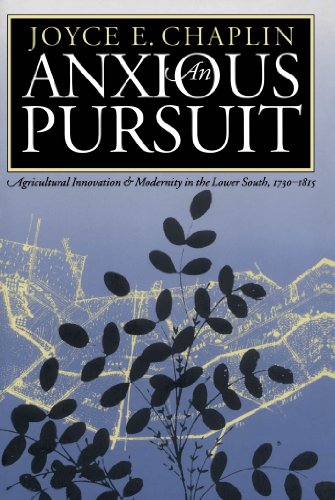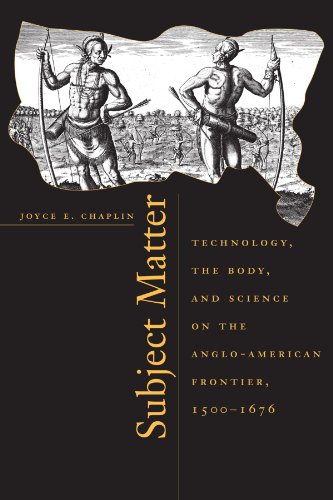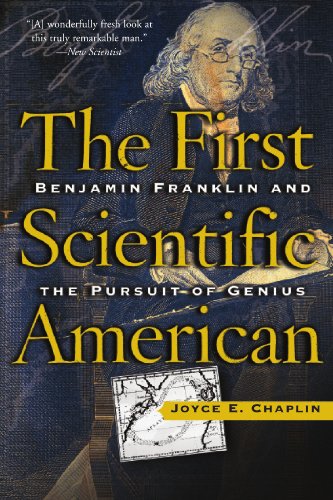Background
Chaplin, Joyce Elizabeth was born on July 28, 1960 in Antioch, California, United States. Daughter of Oliver F. Chaplin and Joyce Louise Gibbs.


(In An Anxious Pursuit, Joyce Chaplin examines the impact ...)
In An Anxious Pursuit, Joyce Chaplin examines the impact of the Enlightenment ideas of progress on the lives and minds of American planters in the colonial Lower South. She focuses particularly on the influence of Scottish notions of progress, tracing the extent to which planters in South Carolina, Georgia, and British East Florida perceived themselves as a modern, improving people. She reads developments in agricultural practice as indices of planters' desire for progress, and she demonstrates the central role played by slavery in their pursuit of modern life. By linking behavior and ideas, Chaplin has produced a work of cultural history that unites intellectual, social, and economic history. Using public records as well as planters' and farmers' private papers, Chaplin examines innovations in rice, indigo, and cotton cultivation as a window through which to see planters' pursuit of a modern future. She demonstrates that planters actively sought to improve their society and economy even as they suffered a pervasive anxiety about the corrupting impact of progress and commerce. The basis for their accomplishments and the root of their anxieties, according the Chaplin, were the same: race-based chattel slavery. Slaves provied the labor necessary to attain planters' vision of the modern, but the institution ultimately limited the Lower South's ability to compete in the contemporary world. Indeed, whites continued to wonder whether their innovations, some of them defied by slaves, truly improved the region. Chaplin argues that these apprehensions prefigured the antimodern stance of the antebellum period, but she contends that they were as much a reflection of the doubt inherent in theories of progress as an outright rejection of those ideas.
http://www.amazon.com/gp/product/0807846139/?tag=2022091-20

( With this sweeping reinterpretation of early cultural ...)
With this sweeping reinterpretation of early cultural encounters between the English and American natives, Joyce E. Chaplin thoroughly alters our historical view of the origins of English presumptions of racial superiority, and of the role science and technology played in shaping these notions. By placing the history of science and medicine at the very center of the story of early English colonization, Chaplin shows how contemporary European theories of nature and science dramatically influenced relations between the English and Indians within the formation of the British Empire. In Chaplin's account of the earliest contacts, we find the English--impressed by the Indians' way with food, tools, and iron--inclined to consider Indians as partners in the conquest and control of nature. Only when it came to the Indians' bodies, so susceptible to disease, were the English confident in their superiority. Chaplin traces the way in which this tentative notion of racial inferiority hardened and expanded to include the Indians' once admirable mental and technical capacities. Here we see how the English, beginning from a sense of bodily superiority, moved little by little toward the idea of their mastery over nature, America, and the Indians--and how this progression is inextricably linked to the impetus and rationale for empire.
http://www.amazon.com/gp/product/0674011228/?tag=2022091-20

( Famous, fascinating Benjamin Franklin-he would be neith...)
Famous, fascinating Benjamin Franklin-he would be neither without his accomplishments in science. In this authoritative intellectual biography of America’s most brilliant and cosmopolitan Founding Father, Joyce Chaplin considers Franklin’s scientific work as a career in its own right as well as the basis of his political thought. The famous kite and other experiments with electricity were only part of Franklin’s accomplishments. He charted the Gulf Stream, made important observations in meteorology, and used the burgeoning science of political arithmetic” to make unprecedented statements about America’s power. Even as he stepped onto the world stage as an illustrious statesman and diplomat in the years leading up to the American Revolution, his fascination with nature was unrelenting.
http://www.amazon.com/gp/product/0465009565/?tag=2022091-20
Chaplin, Joyce Elizabeth was born on July 28, 1960 in Antioch, California, United States. Daughter of Oliver F. Chaplin and Joyce Louise Gibbs.
Bachelor, Northwestern University, Evanston, Illinois, 1982. Master of Arts, Johns Hopkins University, Baltimore, 1984. Doctor of Philosophy, Johns Hopkins University, 1986.
Associate professor history Vanderbilt University, Nashville, 1986—2000. Professor history Harvard University, Cambridge, Massachusetts, since 2000.
(In An Anxious Pursuit, Joyce Chaplin examines the impact ...)
( With this sweeping reinterpretation of early cultural ...)
( Famous, fascinating Benjamin Franklin-he would be neith...)
Member of American Antiquarian Society.
Married David Richard Armitage, July 28, 2000.
